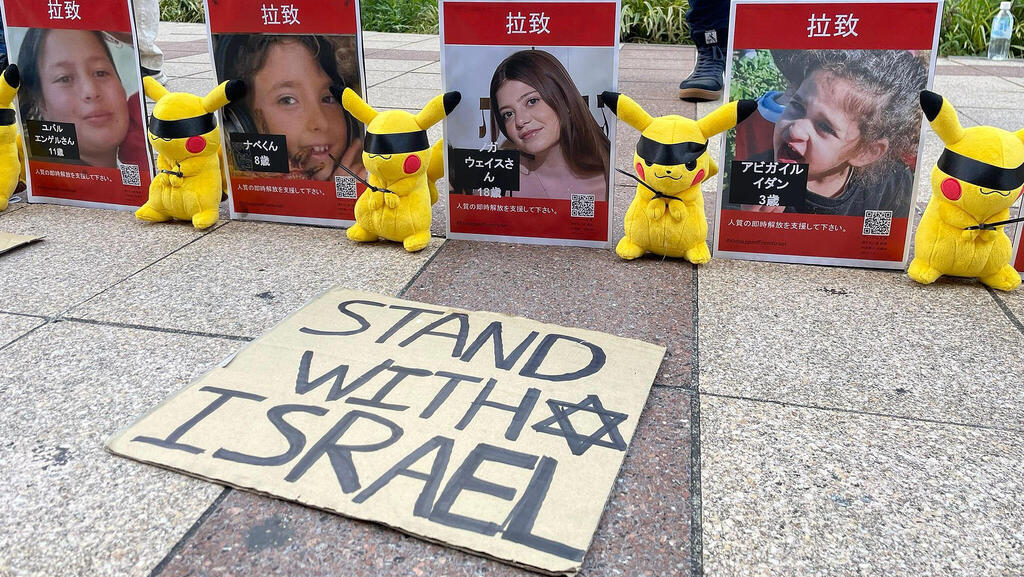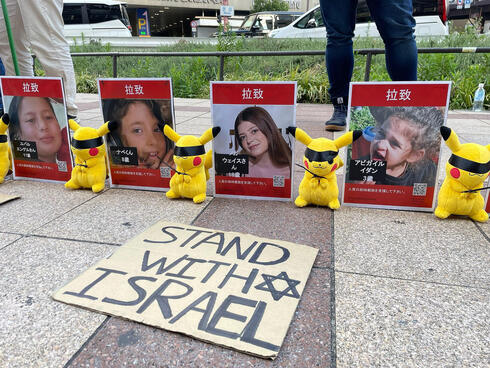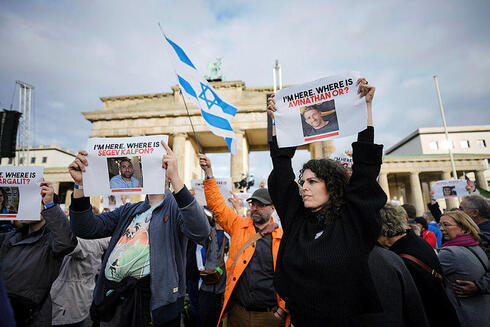
ISRAEL AT WAR
Japan, the Czech Republic and Starbucks: unexpected demonstrations of support for Israel
Amid expressions of hatred, companies and global leaders are standing by Israel. From senior politicians to the toy giant Mattel, Israel has received support, sometimes from surprising sources.
There has been a wave of condemnation, anti-Semitism, and hatred directed towards Israel and Jews across the world since the beginning of the Israel-Gaza War. However, there have also been expressions of support from around the world, not only from countries like the United States, the UK, and France but also from countries whose relations with Israel are not necessarily their most significant diplomatic partners, such as Japan and the Czech Republic. They are joined by American companies and institutions from various sectors, including law firms and financial giants.
In France, the support took a step forward when President Emmanuel Macron proposed to "build a regional and international coalition to battle against terrorist groups that threaten us all," He said that the U.S.-led international coalition built to combat ISIS should also fight against Hamas. In the UK, Prime Minister Rishi Sunak fired a senior aide to the Minister of Technology for calling for a "permanent ceasefire" between Israel and Hamas.
The US: condemnations from Amazon and Airbnb
The storm gripping American academia has far from calmed down. Last weekend, a member of the University of California system’s board of regents, Jay Sures, condemned a letter from around 300 faculty members who demanded that the university retract its condemnation of Hamas's terrorist attacks. "There are absolutely no words to describe how appalling and repugnant I found your letter," he wrote before rejecting their requests. These included a demand to retract the terrorism accusations to "elevate the Palestinian struggle" and express opposition to "Israel's war crimes, ethnic cleansing, and murder."
Related articles:
At the same time, 24 major law firms in the United States sent a letter to law school deans, calling on them to denounce the rise of anti-Semitism in their institutions. They wrote: "Such anti-Semitic activities would not be tolerated at any of our firms," and indicated that such behavior by students could harm their future employment prospects.
American support for Israel also comes from the business world and professional sports leagues. In the face of the growing activity of the Boycott, Divestment, and Sanctions (BDS) movement, over 150 companies and organizations issued statements condemning Hamas's attacks. These include Major League Baseball, the National Football League, Airbnb, Adidas, Amazon, Bank of America, Goldman Sachs, BlackRock, Condé Nast, and toy giant Mattel. This show of support comes in response to calls to boycott McDonald's after it distributed meals to Israeli soldiers and protests against Starbucks after it criticized its union for supporting Hamas’ violence against Israelis in a Post on X which has since been deleted.
The House of Representatives passed a $14.3 billion aid package to Israel over the weekend, although it may face challenges in the Senate since the transfer does not include aid to Ukraine and will require cuts to government services.
Support for Israel is also reflected among the American public. Despite the wave of pro-Palestinian protests and the apparent dominance of anti-war discourse in universities, a recent poll conducted by the University of Maryland in collaboration with Ipsos revealed a growing support for Israel. The poll, which examined American public attitudes toward the Israeli-Palestinian issue and was conducted in the last week of October, found an increase in the percentage of Americans who want the United States to continue its support for Israel, from 25.4% in June to 42.9% in October. Among Republicans, there was an increase from 47.3% in June to 71.9% in October, while among Democrats, the support increased from 13.7% to 30.9%. In contrast, support for Palestinians saw a slight decrease, from 1.3% to 1.2% among Republicans and from 10.4% to 9.2% among Democrats. In the general public, support increased from 5.6% in June to 6.1% in October.
Czech Republic: a firm stance by government ministers
The United States is far from the only country that has stood by Israel. In the Czech Republic, Defense Minister Jana Černochová called on her country last week to withdraw from the United Nations in response to the failure of the General Assembly to condemn Hamas or demand the release of Israeli hostages in Gaza. "I am ashamed of the UN. In my opinion - the Czech Republic has nothing to expect in an organization that supports terrorists and does not respect the basic right to self-defense. Let's get out," she wrote on X. "One must not stand silent in the face of a second Holocaust," she emphasized. Later, she said that the UN needed at least to be reorganized to avoid such a situation in which Iran sits at the head of the UN Human Rights Council.
While the European Union is trying to balance its expressions of support for Israel with the worsening humanitarian situation in Gaza, Czech Prime Minister Petr Fiala insists on making his position clear. "Israel has an absolute right to defend itself. Support for Israel in this situation is the only correct position," he said. "Support for terrorist organizations that use civilians as human shields is unacceptable. The Czech Republic stands by Israel." Fiala, who visited Israel to express solidarity, will also seek to get a promise of support from the EU Council. "The country that was attacked, that defends itself, its existence, and its people, is Israel," he added recently. "Israel is also the only functioning democracy in the Middle East and is the key to stability in the region. A secure Israel will contribute to the security of the European continent. This is the long-term foreign policy position of our country, which remains unchanged despite changing governments."
Japan: economic sanctions against Hamas
In Japan, which may be a less expected partner, personal economic sanctions were imposed on nine members of Hamas and one private company linked to the organization. This is particularly exceptional because, while a designated terrorist organization by the U.S. since 1997, and by the European Union and the UK in recent years, few sanctions have been placed on Hamas and its affiliated entities. Thirty-three countries, including Canada, Australia, and Cyprus, have imposed sanctions on Hamas over the years, and a relatively low number of around 150.
Japan's support is not straightforward. Ninety-four percent of Japan's oil imports come from Middle Eastern countries that support the Palestinians. Indeed, as the conflict escalated, Japanese Prime Minister Fumio Kishida was careful not to label Hamas's attacks as "terrorism," even though Japan has officially recognized Hamas as a terrorist organization since 2003. Japan also did not join the G7 and Canada's October 22 statement regarding Israel's right to self-defense. Nevertheless, as the conflict has intensified, Japan's stance has become clearer, and Foreign Minister Yōko Kamikawa visited Israel and Jordan. In addition to announcing $65 million worth of humanitarian aid to Gaza, Kamikawa condemned Hamas' attacks, calling them acts of terrorism, and expressed support for Israel's right to defend itself.
Germany: no citizenship for antisemites
In Germany, where there has been a surge of anti-Israel protests and antisemitism, measures were taken to prevent those involved in antisemitic behavior from obtaining citizenship. In parallel, Interior Minister Nancy Faeser has formally banned activity by or in support of Hamas and the German branch of the Samidoun Palestinian Prisoner Solidarity Network, which supports it.
Despite Germany's strong support for Israel, Germany recently abstained from voting against the UN resolution that called for a humanitarian ceasefire, causing tension. The vote, which passed with a large majority, stirred controversy among member states and highlighted the historical role of the UN — to serve as a platform for performative politics without content.
Canada led an effort to amend the original text of the resolution, which made no mention of Hamas, in order to condemn Hamas’ attacks and tactics. The amendment sought to define Hamas as a terrorist organization, including a condemnation, as well as a demand for the release of Israeli hostages. While the amendment to the original text won the support of a large majority of 88 countries, with 55 against and 23 abstentions, it did not reach the required two-thirds majority to pass. Thus, the UN was left with the original proposal calling only for a humanitarian ceasefire, with no mention of Hamas or the hostages. Israel and the United States were among only 12 countries who opposed the resolution versus 120 in favor, and 45 who abstained.

